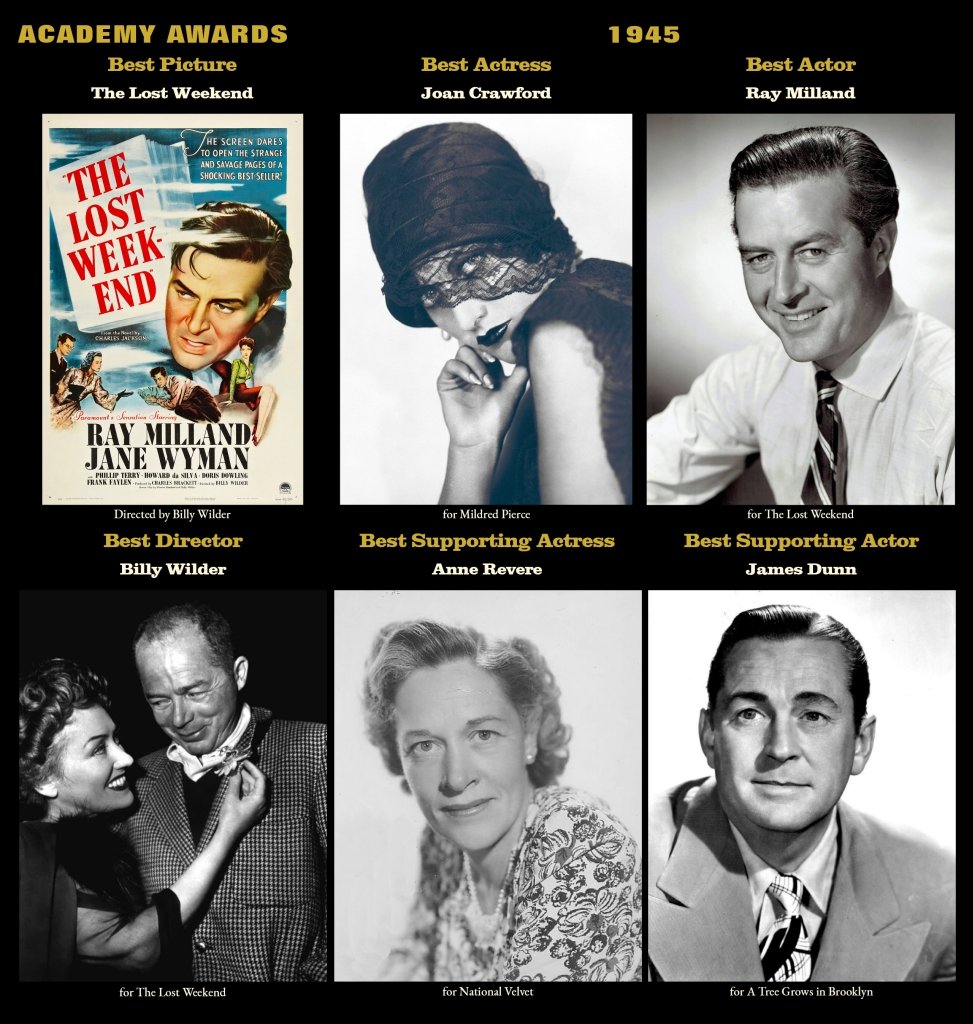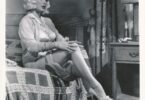The Lost Weekend is a 1945 American film directed by Billy Wilder.
Based on a novel by Charles R. Jackson, it is one of the most notable cinematic indictments of alcoholism. It belongs to Wilder’s noir period, because although formally a drama, it has a structure and elements more typical of a noir thriller.
In 2011, The Lost Weekend was added to the Library of Congress’ National Film Registry as “culturally, historically or aesthetically significant.”
Both Wilder and lead actor Ray Milland won Oscars for this work.
Lucille Fay Le Sueur (San Antonio, Texas; March 23, 1904-New York; May 10, 1977), known as Joan Crawford, was an American film and television actress who won an Academy Award in 1945. In 1999, the American Film Institute ranked her as the tenth greatest female film star of all time.
She began her career as a second dancer in several theater companies before debuting as a chorus girl on Broadway. Then, thanks to her charisma, personality and competitiveness, Crawford won a film contract with Metro Goldwyn Mayer in 1925 and by the end of the decade emerged as one of the most admired actresses in the final years of silent film.
After successfully adapting to the emerging talkies, Joan Crawford became one of the most acclaimed actresses in Hollywood in the 1930s, 1940s and 1950s and one of the best paid of her time, along with such colleagues as Greta Garbo, Marlene Dietrich, Myrna Loy, Bette Davis and Katharine Hepburn. She often played roles of enterprising, struggling young women who eventually found love; these stories were well received by critics and audiences (especially female audiences) during the Great Depression era. After an unsuccessful period in the late 1930s, during which she was labeled “box-office poison,” she made a triumphant comeback in the mid-1940s, winning the Oscar for best actress for Mildred Pierce in 1945. She married Alfred Steele, president of Pepsi Cola, and even after his death, she was the company’s director for a time. She continued to work regularly in horror films in the 1960s, and after starring in Trog in 1970, she retired from the silver screen for good.
Crawford was married four times, the first three ending in divorce, and the last time she was widowed. She died May 10, 1977, of pancreatic cancer (other sources cite acute myocardial infarction). She had no biological children, but adopted four (Christina, Christopher, Cathy and Cyndi). Her eldest daughter Christina Crawford made a very famous and controversial statement, portraying her alleged harsh childhood with her famous mother in a book that became a bestseller immediately upon publication, Mommy Dearest, accusing her of being a cruel, selfish and manipulative mother, a real scandal at the time, as it was the first time the life of a famous person was so harshly narrated by one of her children.
Ray Milland (Neath (Wales), January 3, 1907 – Torrance (California), March 10, 1986) was a Welsh actor and film director. He worked primarily in the United States. His film career ran from 1929 to 1985.
Milland was born Reginald Truscott-Jones in Neath, Wales. Before becoming an actor, he served in the Royal Household Cavalry. On Sept. 30, 1932, he married Malvinia Warner. He was married to her until his death in 1986. Together they had a son, Daniel, and an adopted daughter named Victoria.
The highlight of his career occurred in 1946. That’s when he won an Academy Award for Best Actor for his role as an alcoholic addict in the movie The Lost Weekend (1945). He also had some success as a director. Starting in the 1950s, he was featured in horror and science fiction films on a limited budget. He was often seen on television, including interview programs. In these he was in high demand because of his great general knowledge and witty answers. In 1970 he had a role in Love Story, in which he was seen without a hairpiece. Milland also wrote several short stories.
In 1986, Milland died of lung cancer in Torrance, California, at the age of 81.
Ray Milland had the very shortest speech at an Oscar ceremony ever. He only took a bow and then left the stage.
Samuel (Billy) Wilder (Sucha, June 22, 1906 – Beverly Hills, March 27, 2002) was an American filmmaker of Jewish descent. Wilder was a multiple Oscar winner and is considered one of the most important directors in American film history.
Wilder began his career as a reporter, first in Vienna and later in Berlin. There he came into contact with the film industry. He was hired as a screenwriter, but had to flee from the rising German Nazism. He would later learn that his entire family had perished in concentration camps.
* He ended up in Paris, where he worked as a director’s assistant for a time. He then began a career as a film director in the United States. In addition, he entered military service and participated in combat operations. After the war, he quickly garnered success as a director. Later in life, although he lost some of his luster, many of his films are still considered classics.
As a screenwriter, Wilder gained experience, among other things, with the director Ernst Lubitsch, whom he helped write the script for the comedy Ninotchka.
Wilder received his first Oscar as early as 1945 for the drama film The Lost Weekend, a story about an author with a drinking problem. In 1944 he shot the crime film Double Indemnity, in 1950 the classic Sunset Boulevard and in 1959 the comedy Some Like It Hot starring Marilyn Monroe.
His work is characterized by cynicism, humor and an original storyline. He was fascinated by a wide variety of subjects and he often used the same actors, such as Jack Lemmon and Walter Matthau.
In 2002, Wilder died of pneumonia at the age of 95.
Anne Revere (New York, June 25, 1903 – Oyster Bay, December 18, 1990) was an American actress.
Revere was a direct descendant of the 18th-century American hero Paul Revere. She was an alumnus of Wellesley College, a liberal arts college in Wellesley near Boston from which she graduated in 1926.
She made her debut on Broadway in 1931 in The Great Barrington. From then on, she built a career both in theater and in Hollywood. As a theater actress, she was awarded a Tony Award for Best Performance by a Featured Actress in a Play in 1960 after her role in Toys in the Attic.
She became the laureate of the 1945 Academy Award for Best Supporting Actress at the 18th Oscar Awards ceremony in 1946 for her role as Mrs. Brown in Clarence Brown’s film National Velvet. She also had two other nominations for this Oscar, in 1944 for her role in Henry King’s The Song of Bernadette as Louise Soubirous and in 1948 for her role in Elia Kazan’s Gentleman’s Agreement as Mrs. Green.
Her film career was on hold for quite some time after she refused to answer when summoned to the House Committee on Un-American Activities in 1951, invoking the Fifth Amendment of the United States Constitution not to testify. Her next film role did not follow until 1970, a small role in Otto Preminger’s Tell Me That You Love Me, Junie Moon as Miss Farber.
Meanwhile, she did take roles in several television soap operas, including The Edge of Night, Search for Tomorrow and Ryan’s Hope.
James Howard Dunn (New York, November 2, 1905-Santa Monica, September 3, 1967) was an American film actor.
Born in New York, of Irish descent, Dunn was the son of a Wall Street broker who, according to Dunn himself, “either had a million or he had nothing.” Dunn began his career in vaudeville before his appearance in the movies in the early 1930s. He made quite an impression with his early roles, including Society Girl (1932) with Peggy Shannon and Hello, Sister! (1933) with Boots Mallory and ZaSu Pitts. Dunn’s other early successes included Bad Girl (1931), Change of Heart (1933) with Janet Gaynor, and three Shirley Temple films, Baby Take a Bow (Grace and Sympathy), Stand Up and Cheer, and Bright Eyes, all 1934.
The following roles did not serve to promote his career, and in the late thirties his expectations were not good because of alcoholism. In 1945 his performance in A Tree Grows in Brooklyn (Human Ties) earned him an Oscar Award for supporting actor. Ironically, he played an alcoholic. His success was not continued, and by the early 1950s he was unemployed, broke and alcoholic. He appeared in the television sitcom It’s A Great Life from 1954 to 1956.
He was married to actress Frances Gifford between 1938 and 1942.
He died of complications following digestive surgery in Santa Monica, California.
James Dunn has two stars on the Hollywood Walk of Fame, one for his contribution to the film industry at 6555 Hollywood Boulevard, and another for his work in television at 7000 Hollywood Boulevard.




